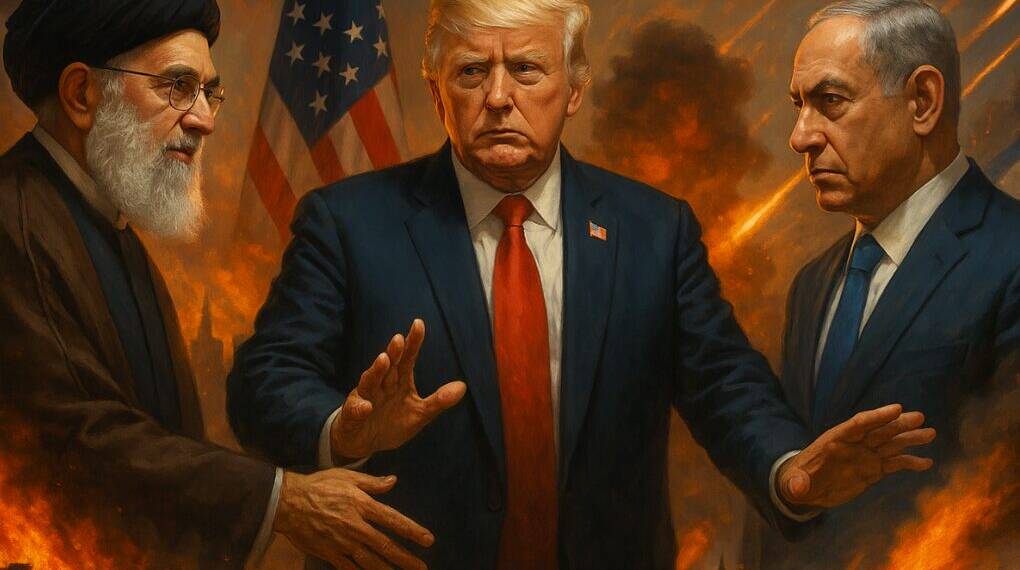The intensifying confrontation between Israel and Iran has now erupted into a full-blown regional crisis. With both sides invoking ‘self-defence’ while flouting international norms, the fallout is threatening to engulf West Asia and destabilise global order.
Israeli Prime Minister Benjamin Netanyahu has openly vowed to neutralise Iran’s nuclear programme through direct strikes. Israel’s intelligence and airpower have decimated much of Iran’s senior military leadership and targeted nuclear scientists. Iran has retaliated with strikes on Israeli infrastructure, albeit with lesser impact. The conflict shows no signs of abating.
All eyes are now on U.S. President Donald Trump, whose next move may shape not just the war’s trajectory but the strategic future of the Middle East.
Trump’s Dilemma and the “Two Weeks” Decision
Although Trump campaigned on ending “forever wars,” his administration is now aiding Israel with naval and aerial support. Earlier, he issued a 60-day ultimatum for Iran to finalise a nuclear deal. Talks collapsed over uranium enrichment—a core sticking point. Tehran insisted on retaining enrichment rights under the NPT, while the U.S. demanded zero enrichment. The deadlock pushed both sides closer to conflict.
Now, Trump has added a fresh twist. On Thursday, he said he would decide “within two weeks” whether the U.S. will launch a military strike on Iran. The announcement, made via White House press secretary Karoline Leavitt, echoes a familiar Trump pattern: promising major action within a two-week window—a timeline he’s used repeatedly on everything from tax policy to conspiracy theories, often without follow-through. Whether this deadline marks a real turning point or political theatre remains to be seen.
Meanwhile, U.S. intelligence, Congress, and even parts of Trump’s MAGA base appear divided. Many suspect that Netanyahu is leveraging the nuclear issue to force America’s hand. The recent dismissal of Colonel Nathan McCormack—who criticised the U.S. as acting like Israel’s proxy—highlighted growing tensions within Washington.
National Intelligence Authority (NIA) chief Tulsi Gabbard has stated that Iran is not close to developing a nuclear weapon, a view echoed by IAEA head Rafael Grossi. Even former Swedish PM Carl Bildt has alleged that Netanyahu’s primary goal was to sabotage any renewed nuclear agreement.
Arab Pushback and Global Realignments
Arab nations—including Saudi Arabia, Türkiye, Azerbaijan, and Pakistan—have condemned Israel’s actions and warned the U.S. against using their airspace. They fear being dragged into the conflict or becoming targets of Iranian retaliation. Iran, in turn, has threatened to strike over two dozen U.S. bases if America formally enters the war.
Pakistan, characteristically hedging its bets, initially issued strong support for Iran. But just days later, Army Chief Gen. Asim Munir was seen having lunch with Trump—suggesting Islamabad is keeping its doors open to Washington.
Globally, diplomatic lines are hardening. Russian President Vladimir Putin has offered to mediate between Israel and Iran, suggesting the U.S. restrain Netanyahu while Russia manages Tehran. China has criticised Israel’s actions and continues to support Iran’s position. Even North Korean leader Kim Jong-un has denounced Israel, calling it a “cancer-like entity” and accusing it of “state-sponsored terrorism.”
Any U.S. military move could draw in these powers—not just diplomatically, but through indirect or even direct confrontation.
Iran’s Strategy and the Risk of Escalation
With Supreme Leader Ayatollah Khamenei delegating operational control to the Islamic Revolutionary Guard Corps (IRGC), Tehran is preparing for the long haul. Despite internal unrest, external threats often unify the population—meaning Israel’s hopes for an internal uprising are likely misplaced.
Iran is also pursuing diplomacy. Foreign Minister Abbas Araghchi has opened back-channel talks with the EU, UK, France, and Germany—all of whom support a non-nuclear Iran but oppose military solutions or regime change. France, in particular, has warned that destabilising Iran would be catastrophic for the region.
Meanwhile, Tehran has warned of possible closure of the Strait of Hormuz and Bab al-Mandab—critical routes for 20% of the world’s oil trade. Such a move could trigger a global energy crisis and economic instability.
Ambassador Anil Trigunayat cautions that Israel’s reliance on brute force will not secure peace. “Bombing Iran won’t spark regime collapse—it will strengthen nationalist sentiment,” he says. Despite its military strength, Israel has not managed to dismantle Hamas, Hezbollah, or the Houthis, and is now wading into even deeper waters.
The world has seen this play out before—Iraq, Libya, Syria—where flawed intelligence and military overreach led to prolonged chaos. Iran risks becoming the next chapter in this tragic history.
Trump’s promised “two weeks” could mark either a crucial diplomatic breakthrough or a catastrophic misstep. As competing powers circle and oil markets brace for impact, what the U.S. president decides in the coming days could reverberate far beyond the Middle East.








